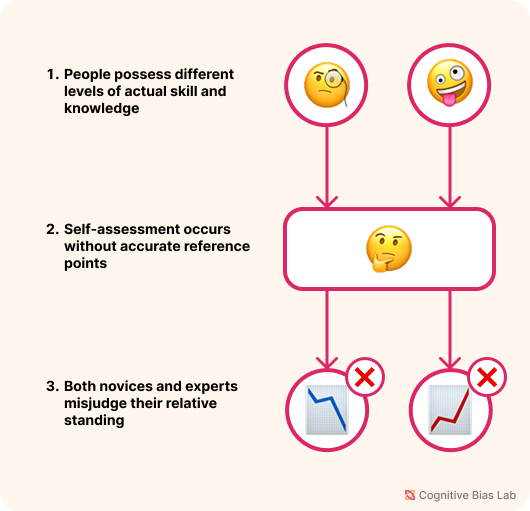Dunning–Kruger Effect
Your progress on this bias test won't be saved after you close your browser.
Understanding Dunning–Kruger Effect
Dunning–Kruger Effect
We often overestimate our abilities when we know the least about a subject, while experts frequently undervalue their skills. This invisible confidence gap affects everything from workplace decisions to personal development.
Overview
The Dunning–Kruger effect occurs when people with limited knowledge or competence in a specific domain significantly overestimate their abilities, while those with expertise tend to undervalue their relative proficiency compared to others.
Key Points:
- The less we know about a subject, the more confident we often become in our perceived mastery of it.
- This bias creates a double burden: not only do we make mistakes due to limited knowledge, but our lack of expertise prevents us from recognizing these errors.
- Metacognitive ability (the skill of knowing what we don't know) develops alongside actual expertise.
- True experts often underestimate their relative standing because they assume tasks that are easy for them must be easy for everyone.
Impact: This cognitive bias significantly influences workplace dynamics, learning processes, and decision-making. For instance, a software developer with basic knowledge might confidently implement a flawed security protocol, resistant to more experienced colleagues' concerns—potentially exposing the company to data breaches.
Practical Importance: Recognizing the Dunning-Kruger effect encourages intellectual humility and continuous learning. It reminds us that confidence alone is not a reliable indicator of competence, and that seeking feedback and maintaining openness to learning are crucial for personal and professional growth.

Visual representation of Dunning–Kruger Effect (click to enlarge)
Examples of Dunning–Kruger Effect
Here are some real-world examples that demonstrate how this bias affects our thinking:
Psychological Study Simulation
The Dunning-Kruger Effect
Experience how our self-assessment of competence relates to actual performance in this recreation of the famous 1999 study by David Dunning and Justin Kruger.
Technology Implementation Disaster
A small business owner with limited IT knowledge installs a security system after watching a few online tutorials. Despite warnings from an experienced consultant, he remains convinced of his capabilities and refuses additional help. Six months later, the company experiences a major data breach because of fundamental security flaws that were invisible to his untrained eye but would have been immediately apparent to an expert.
Medical Self-Diagnosis
After reading several health articles online, a person becomes convinced they understand their symptoms better than medical professionals. They dismiss their doctor's diagnosis and instead self-prescribe treatments based on their limited research. This overconfidence in their medical knowledge leads to worsening conditions and delayed proper treatment, while an actual medical expert would have recognized the complexity of their condition and the limitations of their own knowledge.
How to Overcome Dunning–Kruger Effect
Here are strategies to help you recognize and overcome this bias:
Implement Structured Feedback Systems
Ask others to rate your skills on defined criteria, not general impressions. This reveals blind spots more clearly.
Adopt the Beginner's Mindset
List things you don’t know before starting a task to stay aware of gaps and avoid premature confidence.
Test Your Understanding
Challenge yourself with these questions to see how well you understand this cognitive bias:
A newly hired junior analyst confidently presents a market forecast contradicting established patterns. When senior colleagues raise concerns, they dismiss the feedback as outdated thinking. What's occurring?
Academic References
- Kruger, J., & Dunning, D. (1999). Unskilled and unaware of it: How difficulties in recognizing one's own incompetence lead to inflated self-assessments. Journal of Personality and Social Psychology, 77(6), 1121-1134.
- Kun, A. I., Juhász, C., & Farkas, J. (2023). Dunning–Kruger Effect in Knowledge Management Examination of BSc level Business students. International Journal of Engineering and Management Sciences, 8(1), 14–21.
- What is the Dunning-Kruger Effect? (2025, May 1). The Interaction Design Foundation.